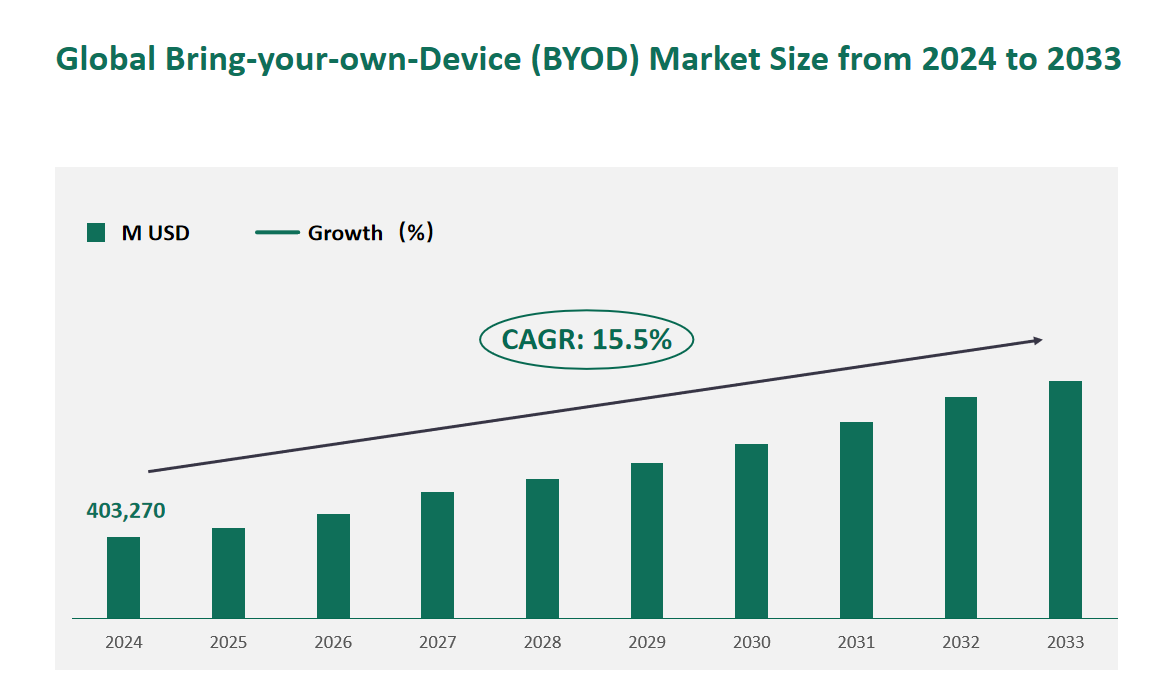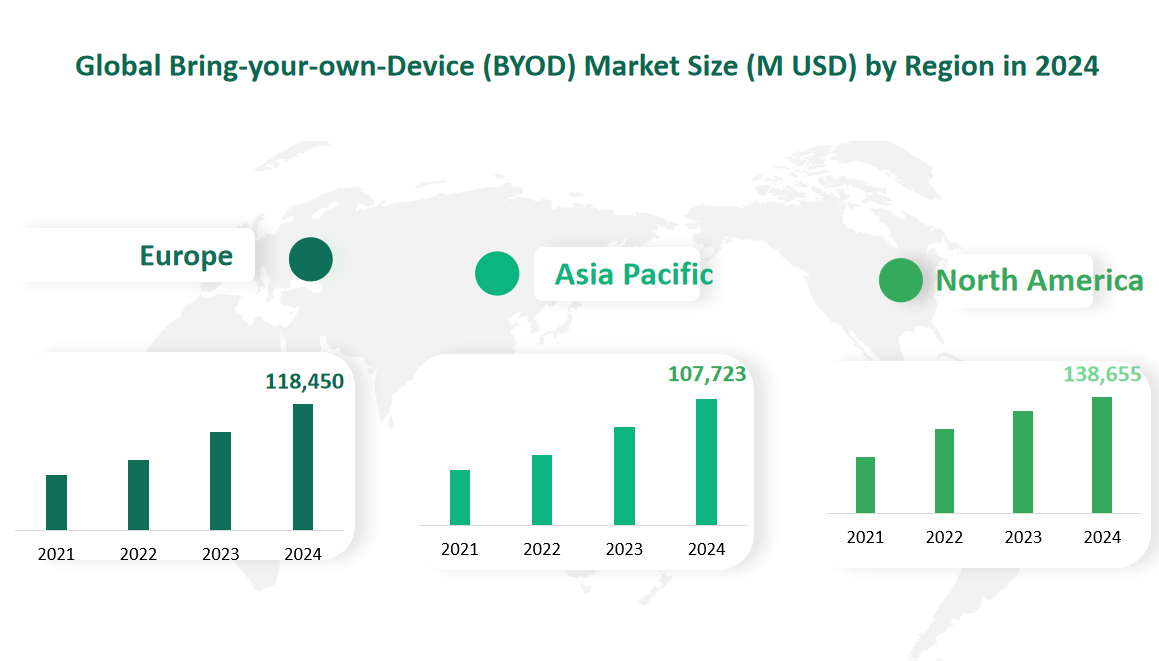1 Global Bring-your-own-Device (BYOD) Market Size (Value) and CAGR (2024-2033)
In 2024, the global Bring-your-own-Device (BYOD) market was valued at USD 403,270 million, with a CAGR of 15.5% from 2024 to 2033.
Bring-your-own-Device (BYOD) refers to carrying your own devices to work, including personal computers, mobile phones, tablets, etc. (and more often, it refers to mobile intelligent terminal devices such as mobile phones or tablets. ) at airports, hotels, cafes, etc., log in to the company email address and online office system, which is not limited by time, place, equipment, personnel and network environment. Products or services for BYOD can provide security and flexibility for all devices, applications and content management requirements.
Figure Global Bring-your-own-Device (BYOD) Market Size (M USD) and CAGR 2024-2033

2 Bring-your-own-Device (BYOD) Market PESTEL Analysis
Political Factors
Political stability and government policies play a crucial role in the development of the BYOD market. Governments’ attitudes towards technology adoption and data security regulations directly impact how organizations implement BYOD policies. For instance, stringent data protection laws in regions like the European Union (EU) necessitate robust security measures for BYOD solutions. Additionally, geopolitical tensions and trade restrictions can affect the supply chain and the availability of devices and components. Companies must navigate these complexities to ensure compliance and maintain operational efficiency.
Economic Factors
Economic conditions have a profound impact on the BYOD market. The global economic slowdown, exacerbated by the COVID-19 pandemic, has led to budget constraints for many organizations. However, BYOD solutions offer cost-saving opportunities by reducing the need for corporate-provided devices. As a result, companies are more inclined to adopt BYOD policies to optimize their IT budgets.
Social Factors
The shift towards remote work and flexible working hours has been a major driver for BYOD adoption. Employees increasingly prefer to use their personal devices for work, as they offer familiarity, convenience, and enhanced productivity. According to a survey by Dell, 70% of companies believe that BYOD improves employee efficiency. Additionally, the rise of millennials and younger generations in the workforce, who are more tech-savvy and accustomed to using personal devices, has further fueled the demand for BYOD solutions. Companies that embrace BYOD policies are likely to attract and retain a more satisfied and productive workforce.
Technological Factors
Technological advancements have been the primary enablers of the BYOD market. Mobile device management (MDM), mobile application management (MAM), and mobile content management (MCM) solutions have evolved to provide secure and efficient management of personal devices in corporate environments. The integration of cloud technology and encryption algorithms has enhanced data security, making BYOD solutions more reliable and trustworthy.
Environmental Factors
The adoption of BYOD policies can have positive environmental impacts. By allowing employees to use their personal devices, companies can reduce the need for additional hardware, leading to lower electronic waste and energy consumption. This aligns with the growing global focus on sustainability and corporate social responsibility.
Legal Factors
Legal considerations are critical in the BYOD market. Organizations must navigate a complex landscape of data privacy laws, intellectual property rights, and employment regulations. For example, the General Data Protection Regulation (GDPR) in the EU imposes strict requirements on how companies handle personal data, including that stored on employee-owned devices. Employers must also address potential legal issues related to data breaches, employee monitoring, and the separation of personal and corporate data.
3 Global Bring-your-own-Device (BYOD) Market Size and Share by Type in 2024
In 2024, the smartphone segment is expected to dominate the BYOD market with a value of 223,258 million USD, accounting for 55.36% of the total market share. Smartphones are the most popular and widely used personal devices in the BYOD market. They offer high mobility, advanced computing capabilities, and a wide range of applications. Smartphones are particularly favored for their convenience, allowing employees to stay connected and productive from virtually anywhere. The increasing adoption of smartphones in both personal and professional settings has driven the demand for BYOD solutions that support these devices. Companies are leveraging mobile device management (MDM) and mobile application management (MAM) solutions to ensure secure access to corporate data while maintaining employee privacy.
The tablet segment is also a significant part of the BYOD market, with a projected value of 92,523 million USD in 2024, representing 22.94% of the total market share. Tablets are larger than smartphones but more portable than laptops, making them ideal for tasks that require a larger screen and more computing power. They are commonly used in industries such as retail, healthcare, and education, where mobility and ease of use are crucial. Tablets are particularly useful for tasks like inventory management, patient care, and classroom instruction. BYOD solutions for tablets focus on providing secure access to corporate applications and data while ensuring compliance with industry regulations.
Laptops, which offer a balance between portability and performance, are projected to have a market value of 64,609 million USD in 2024, accounting for 16.02% of the total market share. Laptops are commonly used in industries that require more robust computing capabilities, such as IT & Telecom, BFSI, and government sectors. They are often preferred for tasks that involve extensive data processing, software development, and complex document management. BYOD solutions for laptops focus on ensuring secure access to corporate networks, data encryption, and remote management capabilities to maintain data integrity and security.
Table Global Bring-your-own-Device (BYOD) Market Size and Share by Type in 2024
Type | Market Size 2024 | Market Share 2024 |
Tablet | 92523 | 22.94% |
Laptop | 64609 | 16.02% |
Smartphones | 223258 | 55.36% |
Others | 22879 | 5.67% |
4 Global Bring-your-own-Device (BYOD) Market Size and Share by Application in 2024
Retail is a major application area for BYOD, with a projected market value of 74,657 million USD in 2024. This sector benefits from BYOD through enhanced customer service, inventory management, and employee productivity. Retail employees can use their personal devices to access real-time inventory data, process transactions, and provide better customer support.
Healthcare is another significant application area, with a market value of 19,040 million USD in 2024. BYOD in healthcare allows medical professionals to access patient records, diagnostic tools, and communication platforms using their personal devices. This enhances the efficiency of patient care and ensures that healthcare providers can stay connected and informed at all times.
BFSI is one of the largest segments, with a projected market value of 124,257 million USD in 2024. Financial institutions leverage BYOD to improve employee productivity and customer service. BYOD solutions in BFSI focus on secure access to financial data, compliance with regulatory requirements, and enhanced cybersecurity measures to protect sensitive information.
IT & Telecom is a rapidly growing segment, with a projected market value of 63,204 million USD in 2024. This sector benefits from BYOD through improved collaboration, remote access to systems, and enhanced productivity. IT professionals can use their personal devices to manage networks, troubleshoot issues, and stay connected with their teams.
Government is another key application area, with a projected market value of 24,730 million USD in 2024. BYOD in government agencies enhances communication, improves efficiency, and allows for better data management. Government employees can use their personal devices to access secure databases, collaborate on projects, and stay informed about policy changes.
Energy & Utilities is a growing segment, with a projected market value of 33,558 million USD in 2024. This sector benefits from BYOD through improved field operations, real-time data access, and enhanced communication. Utility workers can use their personal devices to access maintenance records, monitor equipment, and communicate with central offices.
Automotive is an emerging segment, with a projected market value of 41,024 million USD in 2024. BYOD in the automotive industry enhances productivity, improves customer service, and supports remote work. Automotive professionals can use their personal devices to access design tools, manage supply chains, and stay connected with customers.
Table Global Bring-your-own-Device (BYOD) Market Size and Share by Application in 2024
Application | Market Size (M USD) 2024 | Market Share 2024 |
Retail | 74657 | 18.51% |
Healthcare | 19040 | 4.72% |
BFSI | 124257 | 30.81% |
IT & Telecom | 63204 | 15.67% |
Government | 24730 | 6.13% |
Energy & Utilities | 33558 | 8.32% |
Automotive | 41024 | 10.17% |
Others | 22799 | 5.65% |
5 Global Bring-your-own-Device (BYOD) Market Size by Region in 2024
North America is a leading region in the BYOD market, with a projected market value of 138,655 million USD in 2024. This region has a high adoption rate of BYOD solutions, driven by advanced technology infrastructure and a focus on cybersecurity. Companies in North America are leveraging BYOD to improve employee productivity and enhance data security.
Europe is another significant region, with a projected market value of 118,450 million USD in 2024. European companies are adopting BYOD solutions to comply with strict data protection regulations such as GDPR. The region benefits from a well-developed IT infrastructure and a high level of digital literacy among employees.
Asia-Pacific is the fastest-growing region, with a projected market value of 107,723 million USD in 2024. This region is experiencing rapid technological advancements and increasing adoption of mobile devices. Companies in Asia-Pacific are leveraging BYOD to enhance productivity and stay competitive in the global market.
Figure Global Bring-your-own-Device (BYOD) Market Size by Region in 2024

6 Major Players in Global Bring-your-own-Device (BYOD) Market
6.1 Apple
Company Profile: Apple Inc. is an American multinational technology company headquartered in Cupertino, California. Founded in 1976, Apple designs, develops, and sells consumer electronics, computer software, and online services. The company is renowned for its innovative products, including the iPhone, iPad, Mac computers, and Apple Watch. Apple’s business overview highlights its focus on providing seamless integration between hardware and software, ensuring a superior user experience.
Product or Service Introduction: Apple’s BYOD solutions are centered around its robust ecosystem of devices and services. The Apple operating system supports mobile device management (MDM), enabling organizations to securely configure and manage large-scale Apple device deployments. Apple’s MDM solutions include features such as device registration, wireless configuration, compliance monitoring, and remote management capabilities. Additionally, Apple offers user registration for BYOD deployments, providing independent encryption of user and enterprise data.
Recent Financial Performance: In the most recent year, Apple reported a revenue of $30610 million.
6.2 Samsung
Company Profile: Samsung Electronics Co., Ltd. is a South Korean multinational conglomerate headquartered in Samsung Town, Seoul. Established in 1938, Samsung has grown to become one of the world’s largest electronics manufacturers, offering a wide range of consumer and industrial electronic equipment. The company is known for its extensive product portfolio, including smartphones, tablets, laptops, and home appliances.
Product or Service Introduction: Samsung’s BYOD solutions focus on providing secure and efficient device management. Key features include On-Device Encryption (ODE) to protect sensitive company data, Virtual Private Network (VPN) for secure access to corporate networks, and Mobile Device Management (MDM) for seamless integration with leading MDM solutions. Samsung’s Knox platform offers defense-grade security, ensuring that corporate data remains secure while allowing employees to use their personal devices for work.
Recent Financial Performance: In the most recent year, Samsung reported a revenue of $17767 million.
6.3 Microsoft
Company Profile: Microsoft Corporation is an American multinational technology company headquartered in Redmond, Washington. Founded in 1975, Microsoft is a global leader in computer software, consumer electronics, personal computers, and related services. The company is known for its widely-used operating systems, software applications, and cloud services, which are integral to the modern digital landscape.
Product or Service Introduction: Microsoft’s BYOD solutions are designed to provide comprehensive management and security for a variety of devices. Products like Microsoft Intune offer simplified management, easy app deployment, and personalized experiences for users. Intune for Education, for example, allows educators to set up classrooms quickly and manage devices and apps efficiently. Microsoft’s solutions focus on ensuring that BYOD deployments are secure, compliant, and user-friendly.
Recent Financial Performance: In the most recent year, Microsoft reported a revenue of $13730 million.

